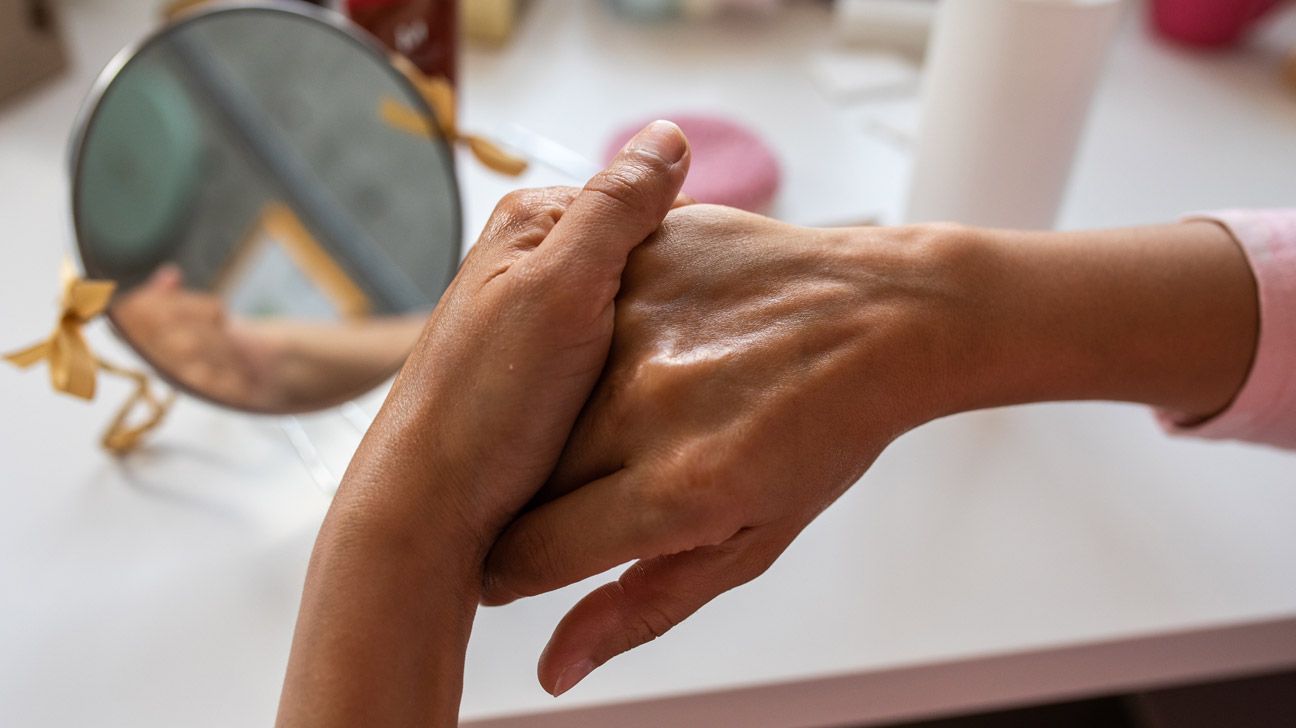If you’ve developed new symptoms like an itchy rash or sores on your hands, a doctor can determine whether it might be eczema or a fungal infection.

Skin conditions can be difficult to navigate, especially when so many of them can cause similar or overlapping symptoms. For example, two conditions that can cause similar skin symptoms — especially when affecting the hands — are fungal infections and eczema.
Fungal infections and eczema can cause skin on the hands to feel itchy and irritated or appear dry, red, or discolored. However, there are some distinct symptoms for each of these conditions that may make it easier to tell which one you have.
Below, we’ll share some of the important differences in symptoms between fungal infections of the hand and hand eczema, including treatments and home remedies for both conditions.
Fungal skin infections develop when microorganisms called fungi invade the skin, usually through a wound or lesion, and multiply faster than usual. As the infection develops, you might notice symptoms such as an itchy, inflamed rash or patches of red, discolored, or scaly skin.
Fungal infections usually appear on body areas that are frequently sweaty or damp, like the genital area, between the toes, and other areas with skin folds. However, these types of infections can also cause symptoms to appear on the hands and nails.
Eczema, sometimes called atopic dermatitis, is an inflammatory skin condition that develops due to inflammation affecting the outer layer of the skin. Eczema can cause skin to become dry, itchy, scaly, red, or discolored. Bumps or other sores sometimes accompany the condition.
Eczema can appear anywhere on the body, but it commonly affects the face, neck, crooks of the elbows and knees, and hands and feet. One type of eczema, called dyshidrotic eczema, causes blisters and scaly or flaky skin on the fingers and palms of the hands.
Differences between fungal infections and eczema
Though fungal infections and eczema can cause the hands to appear dry, itchy, or inflamed, there are some differences when it comes to other symptoms:
- Fungal infections can cause rashes that appear raised on the skin, sometimes even in distinct circles, and the infection may be limited to only one hand. Severe fungal infections can also cause cracks, sores that ooze discolored fluid, or a fever.
- Eczema often appears as a rash with no clearly defined borders, either flat or raised, depending on the type of eczema, and affects both hands simultaneously. Eczema sores ooze clear fluid when not infected, and outbreaks rarely cause a fever.
Even with the differences in fungal infection and eczema symptoms, determining which condition you might have can be difficult. When in doubt, talk with a doctor or dermatologist.
Getting the right diagnosis for your symptoms is the first step in treating them — especially since both conditions require different treatment approaches.
Fungal infection treatment
Fungal skin infections require medication, but at-home measures like keeping the skin clean and dry and using over-the-counter (OTC) medications can also address symptoms.
Many antifungal medications can treat a wide range of fungal infections. Some of the most commonly prescribed antifungals for skin infections
- ketoconazole
- clotrimazole
- miconazole
- fluconazole
- amphotericin B
- nystatin
- terbinafine
- griseofulvin
Some of these options are available over the counter, while others are available only with a prescription.
Also, having other options on hand to treat symptoms like itchiness and inflammation can be helpful. For example, topical corticosteroids can help reduce itching and redness, while cold compresses on the hands can provide additional symptom relief.
Eczema treatment
There’s no cure for eczema, but
Some topical, oral, and injectable medications can help manage severe hand eczema by reducing symptoms like itching and inflammation. Commonly prescribed eczema medications include:
- corticosteroids
- topical calcineurin inhibitors (TCIs)
- immunomodulators
- biologics
- Janus kinase (JAK) inhibitors
In addition to medication for symptom management, another part of eczema treatment is lifestyle changes.
One of the most essential at-home approaches for eczema is identifying your flare-up triggers so that you can avoid them. It’s also important to make sure you’re keeping your skin hydrated and moisturized, especially during and after flare-ups.
It’s not always easy to tell whether your symptoms are from a hand fungal infection or an eczema flare-up. If you notice new symptoms like itching, redness, discoloration, or sores and bumps on your hands, contact a doctor.
Also, eczematic skin is more prone to complications like fungal infections, so it’s possible to have both conditions at the same time. If you’ve been diagnosed with eczema, report any new symptoms to a doctor or a dermatologist.
Fungal infections that affect the hands can appear with symptoms similar to eczema — dry, itchy, irritated skin and cracks, bumps, and sores that weep and ooze. However, some symptoms may help differentiate between the two conditions.
If you’ve noticed new itching, dryness, irritation, or unexplained cracks, wounds, bumps, or sores on your hands, contact a doctor as soon as you can. With a proper diagnosis, you’ll be able to get the right treatment for your symptoms.